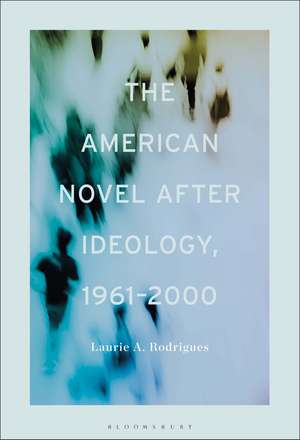The American Novel After Ideology, 1961–2000
Autor Professor or Dr. Laurie Rodriguesen Limba Engleză Paperback – 29 iun 2022
| Toate formatele și edițiile | Preț | Express |
|---|---|---|
| Paperback (1) | 197.24 lei 6-8 săpt. | |
| Bloomsbury Publishing – 29 iun 2022 | 197.24 lei 6-8 săpt. | |
| Hardback (1) | 539.18 lei 6-8 săpt. | |
| Bloomsbury Publishing – 9 dec 2020 | 539.18 lei 6-8 săpt. |
Preț: 197.24 lei
Nou
Puncte Express: 296
Preț estimativ în valută:
37.74€ • 41.13$ • 31.80£
37.74€ • 41.13$ • 31.80£
Carte tipărită la comandă
Livrare economică 23 aprilie-07 mai
Preluare comenzi: 021 569.72.76
Specificații
ISBN-13: 9781501371417
ISBN-10: 150137141X
Pagini: 232
Dimensiuni: 152 x 229 mm
Greutate: 0.31 kg
Editura: Bloomsbury Publishing
Colecția Bloomsbury Academic
Locul publicării:New York, United States
ISBN-10: 150137141X
Pagini: 232
Dimensiuni: 152 x 229 mm
Greutate: 0.31 kg
Editura: Bloomsbury Publishing
Colecția Bloomsbury Academic
Locul publicării:New York, United States
Caracteristici
Will appeal to students interested in the historical-political-cultural aspects of literary interpretation (once out of vogue, now increasingly popular again in literary criticism)
Notă biografică
Laurie A. Rodrigues holds a PhD from the University of Rhode Island. Her research and teaching is focused in 20th- and 21st-century Multiethnic American literatures, cultures, and critical theory.
Cuprins
1. Introduction. "Ideology & American Literary Studies after WWII"2. First Chapter. "Cliché & 'Modern' Womanhood: Franny Glass at the End of Ideology"3. Second Chapter. "Ideology & Nostalgist Aesthetics: The Flagellants"4. Third Chapter. "Almanac & the 'Sorcery' of Historical Narrative"5. Fourth Chapter. "Affectation as Aesthetic in The Human Stain"6. Conclusion.
Recenzii
The American Novel After Ideology is essential reading for scholars seeking to interrogate 'ideology's operational elision' from literary studies after the end of WWII, a period first described by Daniel Bell as 'the end of ideology.' Rodrigues' perceptive study insists, contra such discourses of the end and of accomplished consensus, on historicizing specific post-war moments in which literary production occurs to reveal omissions, distortions, 'problems of inscription.' These arise at many levels, beginning with critically overlooked and dismissed novels, like J.D. Salinger's Franny and Zooey & Carlene Hatcher Polite's The Flagellants, which have not received much attention and have disappeared from literary history; uncanny resonances between the works considered; the jarring discontinuities that exist, in these novels, with respect to dominant modes of interpretation and an apparently 'finished' ideological system. Rodrigues' rich interpretive framework-exploratory and interdisciplinary-thereby inspires us to reconsider the place of ideology in literary production.
Rodrigues combines insightful close reading, compelling historical evidence, and deft theoretical explication to demonstrate how post-WWII writers wrestled with sociopolitical and literary narratives in a supposedly post-ideological age. Like the texts she examines, Rodrigues interprets interpretation, offering an illuminating study of American cultural meaning-making, as well as a new model for literary interpretation.
Rodrigues combines insightful close reading, compelling historical evidence, and deft theoretical explication to demonstrate how post-WWII writers wrestled with sociopolitical and literary narratives in a supposedly post-ideological age. Like the texts she examines, Rodrigues interprets interpretation, offering an illuminating study of American cultural meaning-making, as well as a new model for literary interpretation.
